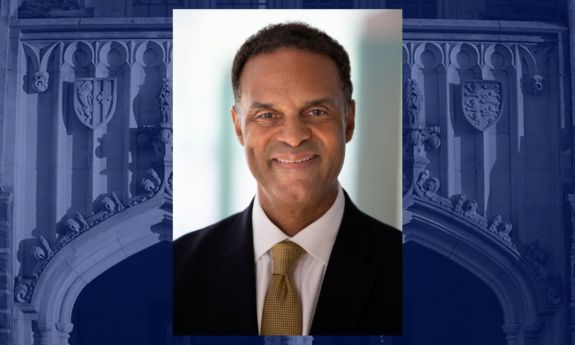Gallimore Addresses Faculty on Growing Duke
New provost speaks at first Academic Council meeting

“At the University of Michigan, we had a phrase of ‘going from great to best.’ I don’t want to declare Duke to be the best university in the South or in the nation. I want to declare that it’s the best Duke we can be, always in alignment with our mission and living within our values.”
Gallimore arrives at Duke at a time of significant change in higher education, with challenges to teaching, research and its position in society. Fielding questions from council members, Gallimore said he expected Duke to be strongly engaged in contentious issues, even though being a private institution shields it from some of these challenges.
“We have a general challenge to get society to believe in us again. Duke is in a great position because of our elite status, which means we have people watching what we say and do, but also being in the South is an opportunistic place to be as well. It’s the crossroads where our cultures reside, and we’re able to set the tone for next century of the region and, frankly, this country.”
“We have a general challenge to get society to believe in us again. Duke is in a great position because of our elite status, which means we have people watching what we say and do, but also being in the South is an opportunistic place to be as well. It’s the crossroads where our cultures reside, and we’re able to set the tone for next century of the region and, frankly, this country.”
Alec Gallimore
Universities should meet a moment of polarization, economic and climate crises, and pressures, Gallimore said, by emphasizing its value in educating students, “teaching them to be resilient as they can go into the world and be the best global citizens possible so they can understand how to work in teams and disagree without being disagreeable.”
Asked about the U.S. Supreme Court barring the use of race in admissions decisions, he noted his experience in Michigan in building diverse student bodies under a state constitution that already barred consideration of race. “We will use every tool at our disposal to shape the best undergraduate class. The good news is I’ve had that experience at Michigan and it’s something I’ve been thinking about for a while.”
He also underscored that Duke will not stand apart when public universities are under attack. “Universities are part of the battlegrounds. Duke is important because of our private status. While we are not as beholden to the legislature, we are in one of the states of this battle, and we need to help set the tone for the discussion.”
Addressing Duke’s growing international role, Gallimore said he wants to strengthen Duke’s already valuable global efforts as examples of how Duke faculty and students build meaningful partnerships around important social problems. He added he wanted to connect that effort with ongoing experiential learning projects in Durham and the wider region. Both involve, he said, “working with communities in getting faculty and staff to learn about community concerns and apply what they study to solve them.”
Gallimore also provided a brief personal history, mentioning he is the son of Jamaican immigrants who came to America at a difficult time to be an African American in Washington, D.C., something he honors by using “rasta” as part of his email address. Gallimore was trained as an aerospace engineer with a strong record in space propulsion, plasma physics, which has facilitated explorations of the moon, Mars and beyond.
In addition to Gallimore’s address, faculty asked President Vincent Price about undergraduate admissions policies and a recent New York Times article noting Duke ranked low among peer institutions in socio-economic diversity in its undergraduate population.
President Vincent Price told faculty that he has no role in admissions decisions. Price noted that Christoph Guttentag, dean of undergraduate admissions, reports directly to Gallimore, as the provost is the chief academic officer. He added that current and former trustees are prohibited from writing support letters for applicants, and Duke’s development team has policies preventing its officers from negotiating gifts with people who have children who may be applying to Duke.
As for the New York Times story, Price reinforced his message to the university community following the Times story. He said socio-economic diversity has been a concern for university leaders for some time, and he was disappointed that the Times article didn’t detail some of the measures already put in place to address the issue.
“Much of this has to do with how we recruit,” Price said, noting that the New York Times gave little attention to Duke’s efforts that increased the number of Pell Grant recipients to 17% of this year’s incoming Class of 2027. (This is is a significant increase over the 12% Pell Grant recipient number from the previous decade that was cited in the New York Times article.)
“We were unhappy with the number,” Price added. “It seemed we had topped out in a position we didn’t want to be. So, we mobilized more outreach, used our experiences with recruiting other low-income students and changed our practices.
“We also realized that we had not focused sufficiently on our own region. We developed the new tuition program for students from the Carolinas.” The benefit provides full tuition for undergraduate students from the Carolinas with total family incomes below $150,000.
The meeting was the first led by new council chair Professor Trina Jones of the law school. Jones started the meeting with a tribute to one of her predecessors, Craig Henriquez, Pratt school professor and associate vice provost of faculty advancement, who died Aug. 24 at age 64. Henriquez was council chair from 2009-11.